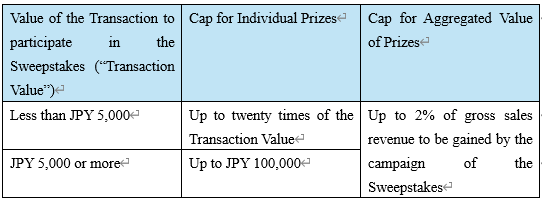

- TOP
- insights_news
- column
- Regulations on Commercial Sweepstakes and Gifts in Japan
Insights & News
Regulations on Commercial Sweepstakes and Gifts in Japan

Introduction
Offering prizes alongside goods or services is a common marketing strategy. In Japan, such practices are regulated by the Act Against Unjustifiable Premiums and Misleading Representations (“AUPMR”). If your business intends to engage in prize-based promotions in Japan, understanding the AUPMR is essential.
Under the AUPMR, “Prize(s)” are defined as are defined as any economic benefits that meet both of the following conditions:
・Provided by a business operator to induce a transaction, and
・Provided in connection with the transaction of goods or services.
The AUPMR, along with relevant administrative notices, establishes four primary frameworks for the regulation of Prizes.
I. General Sweepstakes (Ippan Kensho)
“Sweepstakes” refers to the method of determining the recipient of Prizes or the value of Prizes to be offered by any of the followings.
- Using chance or other random factors to determine the winner (e.g., lottery)
- Determining the winner based on the superiority or inferiority of a specific action or the correctness or incorrectness of an action (e.g., contest).
The table below is a summary of the cap value under the AUPMR for Prizes to be offered in Sweepstakes:
For example, if a SaaS provider offers a lottery for users who purchased its one-year subscription, the lottery falls under Sweepstakes and the economic benefit to be provided to the winner falls under Prizes. When the one-year subscription is JPY 3,000, the value of the Prize to be offered in the Sweepstakes must not exceed JPY 60,000 which is twenty times JPY 3,000. If the subscription is JPY 10,000, the value of the Prize must not exceed JPY 100,000. Moreover, if the anticipated gross sales revenue gained by the campaign is JPY 20,000,000, aggregated value of the Prizes must not exceed JPY 400,000 (It is fine to give JPY 100,000 to four people in the campaign, but not to five.).
II. Sweepstakes (Kyodo Kensho)
Joint Sweepstakes are any of the following Sweepstakes:
・Sweepstakes jointly conducted by a substantial number of retailers or service providers in a specific area
・Sweepstakes jointly conducted by a substantial number of retailers or service providers in a specific shopping district. However, this is limited to a maximum of three times a year, such as during the mid-year and year-end periods, and is limited to a total of 70 days per year.
・Sweepstakes jointly conducted by a considerable number of businesses operating a certain type of business in a certain area.
For example, if those who spend a certain amount of money in the shopping mall is entitled to participate in the sweepstakes, the sweepstakes fall under Joint Sweepstakes. The cap for an individual Prize is up to JPY 3000,000, and the cap for aggregated value of Prizes is up to 3% of gross sales revenue to be gained by the campaign of the Joint Sweepstakes
III. Open Sweepstakes (Open Kensho)
AUPMR does not apply to campaigns that are widely advertised in newspapers, on TV, in magazines, on websites, etc., and for which can be applied by post card, fax, website, email, etc., without the purchasing goods or services or a visit to a physical store being a condition. Such campaigns are generally referred to as “Open Sweepstakes”.
IV. Free Gifts (Sozuke Keihin)
Prizes offered to general consumers without being part of a sweepstakes are generally referred to as “Free Gifts”. For example, Prizes offered to all purchasers of goods or services, or to all customers who visit a store, fall into this category. In addition, Prizes offered in order of application for purchase of goods or services, or in order of arrival at a physical store, also generally fall under the Free Gifts.
The table below is a summary of the cap value under the AUPMR for Prizes to be offered in Free Gifts:
For example, if a SaaS provider offers a gift for all users who purchased its one-year subscription (JPY 3,000), the value of the gift must not exceed JPY 600. If the subscription is JPY 999, the value of the gift must not exceed JPY 200. These rules are only applicable in BtoC context.
V. Others
Certain industries—such as newspapers, magazines, real estate, medical care, medical devices, and sanitation inspection—may be subject to additional or separate regulations beyond the AUPMR. Voluntary industry-specific guidelines may also apply.
Kensei Law Offices are committed to supporting your business in Japan with experienced bilingual legal professionals. If you require legal advice or assistance, please do not hesitate to contact us.




